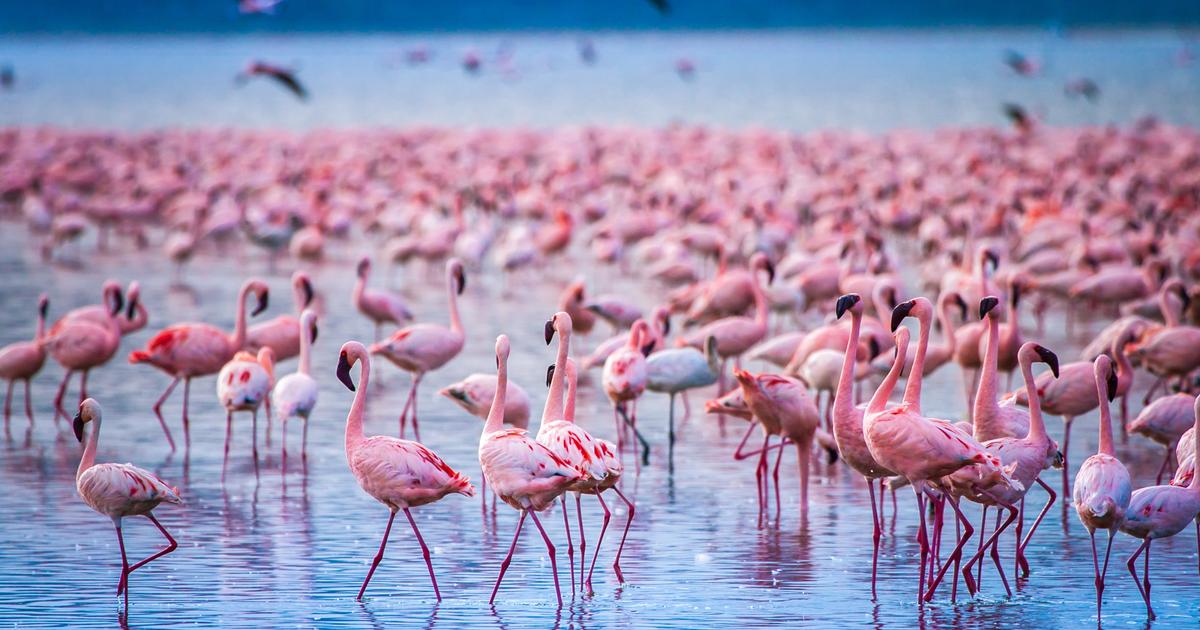Global society
all articles
At nine o'clock in the morning Lyu Qing Chao, 48, is still in bed. At least that's what his employees suspect. Meanwhile, they sell live fish from a tiled pool, because before Lyus fish business in a side street of the Ethiopian capital Addis Ababa, the customers are long ago.
Lyus employees hang the animals in plastic bags on a scale that dangles on a rack in front of the store. They eat flat bread and vegetables from a tray that they put on the sidewalk.
When the boss will get up, nobody knows. He lives next to the store in a one-story cement house. The gate to his property is locked and does not open when you ring the bell.
At a quarter to ten Lyu finally shuffles through the gate, in his hand a leather briefcase. "I drank five cups of coffee yesterday, I could not sleep until early in the morning," he growls and turns around the nearest street corner into a friend's restaurant to have a noodle soup for breakfast.
Heike Klovert / SPIEGEL ONLINE
Breakfast in the Chinese restaurant
The shop and restaurant are located in a neighborhood called Japan Market, which should actually be called China Market, because in the area of Addis Ababa many Chinese have opened shops and restaurants in recent years.
Around one and a half million Chinese are now living in Africa. They came as workers for Chinese private companies and state corporations, which build new skyscrapers, roads, train lines, stadiums or dams there. Others retreated to run Chinese supermarkets, restaurants, guesthouses, and other businesses on their own.
Even Lyu has left home to seek his fortune on the African continent. Almost ten years ago, his former employer, China Airlines, transferred the cook from Chengdu to Addis Ababa. For a year, he prepared Chinese meals for passengers at the airport. Then he started his own business, Lyu tells us, first with a vegetable shop, then with a restaurant, now with the fish shop.
Heike Klovert / SPIEGEL ONLINE
Lyu has been living in Africa for almost ten years
Did he arrive? Did he find his luck?
Many media, including SPIEGEL, regularly report on the geopolitical dimension of China's involvement abroad. They analyze what it means for Europe and the global balance of power that China invests so heavily in Africa. They question China's interests. They warn of a debt trap into which African states are heading.
However, how Chinese people live in Africa is rarely reported in the West. The story of the fish vendor Lyu shows that she sometimes profits little from the status of China as a great power that is steadily expanding her influence in the world.
Lyu has pushed the soup bowl, in which a few more noodles and grease eyes float, aside and pulled out his smartphone. The screen has burst, a crack over the heads of the three people in the photo that wants to show Lyu. With one arm he holds on to a baby, who nestles with closed eyes to his cheek. He has his other arm around the neck of an Ethiopian with short, curly locks. She smiles.
Heike Klovert / SPIEGEL ONLINE
Lyu with daughter and ex-wife
"I loved her," Lyu says, "but she just loved my money." In the past year they parted. The Chinese restaurant, which they had built together, is now closed again. In January, Lyu opened the fish shop. He sees his daughter only every two weeks, she is now five years old. He calls her Tian Xi, bright day. On his cell phone, he has videos of his daughter laughing around on his back.
If Tian Xi did not exist, he would have long since returned to Chengdu, says Lyu, to his paraplegic brother and his mother, whom he misses.
Another reason why he stays: It is not too difficult for Chinese to earn good money in Ethiopia. The country is poor, but the Chinese community is networked, it helps. An acquaintance working in a five-star hotel got him a job, Lyu says. Since then, he has delivered meat and fish worth hundreds of euros each day to the hotel.
Homeless in Addis Ababa
Lyu Qing Chao notes how many fish he has received. Around one and a half million Chinese are now living in Africa. They came as workers for Chinese private companies and state corporations. Others retreated to run Chinese supermarkets, restaurants, guesthouses, and other businesses on their own.
48-year-old Lyu has lived and worked in Ethiopia for almost a decade, and now runs a fish business. The truck brought 130 kilos of fish from the Zway that day, a freshwater lake south of Addis Ababa.
His fishmonger Lyu operates with Ethiopian employees who take care of the sale.
Before loading, they hang fish in plastic bags on a scale.
The store itself consists of little more than a tiled pool in which the goods float.
Lyu set up the business together with an Ethiopian colleague. He sells fish - and she in the shop next to raw meat.
Such cooperations are common in the African country, where Chinese people pay informal royalties to Ethiopians, who register the trade for them.
Previously, Lyu had a restaurant, with an Ethiopian, whom he married. They got a daughter, who is now five years old. Lyu sees her every two weeks.
His wife separated from him last year, Lyu says. Since then he lives in this single-storey house next to the fish shop.
In his kitchen, he keeps a fishing rod - for the day on which he has finally excavated a fish pond on his property.
Lyu has Chinese and local friends in Addis Ababa, as well as this seller, who greets him in the market through the car window.
Nevertheless, Lyu is drawn back to China, to his paraplegic brother and his mother, whom he misses, he says.
With the fish shop, Lyu believes, he could make the equivalent of 3000 euros net profit a month. More than at home in Chengdu. If the hotel would finally pay him. His debt, Lyu says, has now reached around 700,000 birr, which is a good 20,000 euros.
It's midday. Lyu walks through market alleys into which sunlight falls through blue plastic tarpaulins, past stalls where Chinese cabbage and melons pile up. He hangs his shoulders, his hands dangle next to his body, the hem of his sweatpants hangs over his well-worn sneakers.
Lyu was back in the hotel. "They said I should come back next week," he says, his harsh voice sounding depressed. The CEO is currently in France and can not sign the check. "Why did not you say that yesterday, why did you say yesterday that you pay off part of the money today?"
more on the subject
Yesterday, Lyu, in sneakers and unshaven, spent two hours in the hotel in front of a glass conference room where Ethiopians meet in smart costumes and jackets. He drank five cups of coffee, which later prevented him from falling asleep to bridge the waiting.
Today after breakfast he was again in the administrative wing of the hotel. After half an hour, the cook from Chengdu got the message that he still had to wait for his money. He has long since delivered no meat or fish to the hotel. He only hopes that he will soon be able to pay the ten Ethiopians who have delivered goods to him and ask him daily for the money.
"My whole fortune is in this mission," says Lyu. "If it were China, I could sue the hotel," he says. "I do not know how that goes in Ethiopia, but maybe I have to try it, my reputation is at stake."
Heike Klovert / SPIEGEL ONLINE
Lyu in his quarter
His employees have laid grass on the pavement in front of his fish shop, as is customary here on public holidays. A woman crushes freshly roasted coffee beans in a mortar, cooks them in a clay pot and pours the brew into white cups.
Employees attend the coffee ceremony right in front of the shop entrance, where they sit on plastic stools under Chinese paper lanterns. Obviously they do not mind that they block the way to the store. About noon is not much going on anyway.
Lyu sips a cup of coffee and looks down the street. The fish tank is empty, he is waiting for the truck, which brings new fish from the lake Zway. He does not talk much to his employees. As well as? The few terms in English, Mandarin and the native language Amharic, which make up their common vocabulary, are just enough for the business, but not for much more.
Heike Klovert / SPIEGEL ONLINE
Coffee ceremony of the Ethiopian staff
Lyu was one of the first Chinese sellers in the area. He did not want to come to Ethiopia at first, he was not interested in the country. But then he tried it anyway, went over the Japan Market - and saw opportunities. In 2011, he opened his first shop, selling Chinese vegetables and earning better than before, he says.
Meanwhile, Lyu knows many people in the market, he has Chinese and Ethiopian friends, he also learned to appreciate the local customs. Two things, however, complicate the business. Ethiopians are very slow, says Lyu. Second, he can do little without them.
In front of the shop, a woman chatters laughing with the other Ethiopian women sitting around her. Her name is Almaz Aragaw and she worked in Lyus Restaurant before he and his wife split up. In order to start a new business, Lyu again needed someone of Ethiopian nationality who registered the trade for him. He chose Aragaw, mother of four children, because he trusts her. He pays her monthly about 150 euros informal license fee.
Heike Klovert / SPIEGEL ONLINE
Almaz Aragaw
There are Ethiopians who are bothered by the fact that tens of thousands of Chinese now live in Addis. But there are also many who benefit from it. "Chinese buy from Chinese," says Aragaw. "If I get together with a Chinese, they will buy from me too." That's why she set up a meat shop next to Lyu's fish shop.
The truck has arrived, there are again fish swimming in Lyus basin on the road, 130 kilos in total. His staff unloaded the cargo and Lyu took a note of how many animals of which sort were among them.
Now Lyu wants to show how he imagines the future. He closes the metal gate to his cottage and trudges across the meadow, which extends beyond the gate about 30 meters to the next property boundary.
Heike Klovert / SPIEGEL ONLINE
Lyu shows where the fishpond is to be created
He stands in the middle of the grass, swampy from the sewage, and extends his arm forward like a ruler. "Here," he says, "I want to dig up a fishpond." His customers should be able to fish there themselves. A fish plus fishing fun accounts for 200 Birr in Lyus - twice as much as it gets for an animal.
Next to the pond Lyu wants to open a new restaurant. If he has earned enough money, he wants to buy his daughter Tian Xi a piece of land in her name and build her a house on it. A few more years, he says, he needs it. And then, finally, he could go back to China.
This article is part of the project Global Society, for which our reporters report from four continents. The project is long-term and supported by the Bill & Melinda Gates Foundation.
What is the project Global Society?
Under the title Global Society, reporters from Asia, Africa, Latin America and Europe will be reporting on injustices in a globalized world, socio-political challenges and sustainable development. The reportages, analyzes, photo galleries, videos and podcasts appear in the Politics Department of SPIEGEL. The project is long-term and will be supported over three years by the Bill & Melinda Gates Foundation (BMGF).
Are the journalistic contents independent of the foundation?
Yes. The editorial content is created without the influence of the Gates Foundation.
Do other media have similar projects?
Yes. Major European media such as "The Guardian" and "El País" have created similar sections on their news pages with "Global Development" or "Planeta Futuro" with the support of the Gates Foundation.
Was there already similar projects at SPIEGEL ONLINE?
SPIEGEL ONLINE has already implemented two projects in recent years with the European Journalism Center (EJC) and the support of the Bill & Melinda Gates Foundation: The "Expedition The Day After tomorrow" on Global Sustainability Goals and the journalistic refugee project "The New Arrivals" Several award-winning multimedia reports on the topics of migration and escape have emerged.
Where can I find all the publications on the Global Society?
The pieces can be found at SPIEGEL ONLINE on the topic page Global Society.














